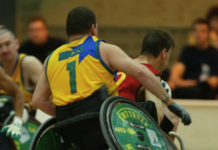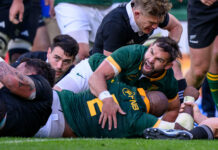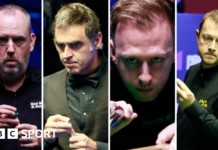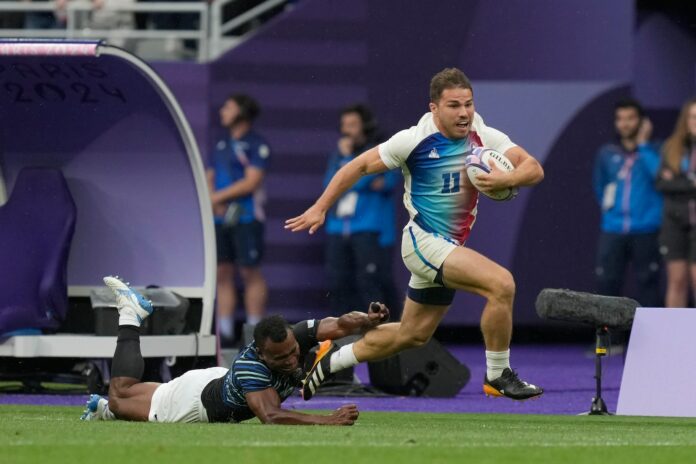SAINT-DENIS, France — In an enchanting motif of recent Olympiads, the great-big world with all its great-big populations and its great-big facilities kept straining to solve laudable little Fiji in one hellacious pursuit. Since Rio de Janeiro in 2016, when the brisk sport of rugby sevens debuted in the Olympics with its 14-minute matches, the world had tried Fiji 17 times and had failed 17 times, all the way to the gold medal tussle at these Paris Olympics.
Good grief, what would it take?
Oh, it would take some things.
To beat Fiji at the Olympics, the evidence from a booming Saturday night suggests, it helps to have a thunderous stadium with about 69,000 belters of the French national anthem, among them President Emmanuel Macron, next to a Fijian fan contingent tiny enough that their singing wasn’t audible upstairs.
To stop Fiji at two gold medals, it helps to have a desperate star such as Antoine Dupont, striving from a bummer in the 2023 World Cup of 15 a side in France, before he veered to the sevens and the medal stand. It helps a lot if, pretty soon, he’s on a long, long run like some French daydream up the left edge of the field, about to feed Aaron Grandidier Nkanang to finish off a try that broke a 7-7 tie before Dupont added two more tries to reach 28-7 and ecstasy.
That’s how a nation of 68 million can manage to upend a nation of 950,000, then send its crooners rejoicing for a solid hour in the acoustic pleasure of Stade de France before they departed to rejoice more elsewhere.
“To the people back home,” said Fiji Manager Osea Kolinisau, the 2016 captain who took the helm mere months ago, “we’re sorry we couldn’t defend the legacy.”
Kolinisau had given a pep talk to his team about the value of a silver, especially given that Fiji had spent recent years dipping into a dry-and-drier spell. Perhaps one of those earthly fan bases in which winning has made people exacting might brook some understanding.
“It’ll be quiet, not like” previous Olympics, said Akuila Cama of the Fijian Broadcasting Corporation. “But still, people will be proud back at home, because we were not expected to win anything in these Games … It is like [soccer] in Brazil, you know. Everyone is a coach. But for this loss, judging from fans’ reactions on social media, they are still proud.”
As one Fijian observer noted, they would still go to church.
They had themselves quite some night owing to the curvature of the Earth. When their team finished off Australia, 31-7, in the semifinal ending around 4:30 p.m. Paris time, that was 2:30 a.m. out in the Pacific in Suva, the Fijian capital and largest city. When it started against France at 7:45 Paris time, that would be 5:45 a.m. in Suva.
“The whole country’s obsessed,” said Waran Goundar, a Fijian living in Sydney, “and there’s more people overseas from the [United] States, Australia, New Zealand, they all follow. I think rugby brings the nation together.”
“When Fiji plays, everything just stops,” said Ulaiasi Tui Tubou, a Fijian who has lived in England since joining the Royal Navy in 2000. “Everything just stops; people are focused on the game. After the game is finished, they’re back again.”
Speaking at the stadium between the semifinals and final, Tui Tubou said knowingly: “Now, everybody’s waiting for the final now, 5 o’clock in the morning. Some of them will have a snooze. Some will be drinking kava, and then when it comes again, everything will be silent. It will be silent, [but then] you can know if Fiji scored a try, because the whole nation will erupt. If you didn’t have a television for watching and you wanted to know, you will know when Fiji scored a try, because everything just goes Baaaaaah! The sound, just, boom, Baaaaaah! All over. And you’ll know we just scored a try.”
Tui Tubou’s brother in Suva had sent pictures of a family gathering of about 10 near other family gatherings close by. They showed people sitting around, waiting through the hours such as 4 a.m. From the stadium, Tui Tubou could picture some of them leaning back, eyes closed.
That sound he impersonated did come to the 110 or so inhabited Fijian islands from among the more than 330. The fast, furious and free approach that translated to mastery in the semifinal when Fiji had trailed Australia 7-0 carried on. The Fijian players had sung the national anthem, “Meda Day Doka” (“God Bless Fiji”), their mouths moving on the TV monitors, tears roaming down the face of player Joseva Talacolo, their trickle of fans inaudible. Next came the overwhelming wow of “La Marseillaise,” the French anthem heard so often at soccer World Cups of the era.
Then play got going, and soon Fiji actually infused that crowd with obvious fret. One very large and fast man, Selestino Ravutaumada, tore across and down the pitch before flipping to a very, very large and fast man, Josaia Raisuqe, who went most of the rest of the way before casually finding Talacolo, who scored. Things quieted for a while, even in a sport without too many whiles.
But France scored to tie before halftime, and right off the kick in the second half, Dupont caused that one really loud try and then scored two more himself.
The world had overcome Fiji at rugby sevens after quite some trying, and as seemingly all of France roared and half the team wept with the host country’s first gold medal, the Fijians crumpled to the grass and stayed awhile, and then Kolinisau had to give that old silver medalists’ talk. He huddled the team beside the bench while the French players ran to different sections of rapturous fans.
“I saw them; they were really disappointed that we didn’t win,” he said. “I just told them: ‘Look, we didn’t win a gold, but we won a silver medal at the Olympics. A lot of athletes dream to be where you are right now. … Some chase it all their lives, but they don’t get a medal.’”
He had come in so recently and had found standards lacking and had written enough “warning letters” to players, he said, that his manager got tired of it. Now he tried to convince them of the hugeness of silver and said, “I know the bar is set really high by the 2016 boys and the 2020 boys, and I know the boys wanted to keep that legacy, but I told them that’s no mean feat to win a silver medal.”
With silver so often all relative, the world finally had forced that wee giant Fiji to ponder silver.
Source link : https://www.washingtonpost.com/sports/olympics/2024/07/27/france-fiji-rugby-sevens-paris-olympics/
Author :
Publish date : 2024-07-28 04:46:52
Copyright for syndicated content belongs to the linked Source.





















































